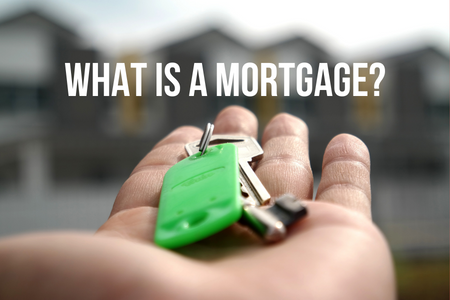Welcome To Our Mortgage Educational Blog About:
What Is A Mortgage?

A mortgage is a type of loan commonly called a real estate loan. It is used to purchase or maintain homes, lands, and other real estate properties, and like other loans, require some assurance of repayment before a lender can approve a borrower’s request for one. As opposed to the idea that mortgages are loans on your home, they are loans on your income, using your home as collateral.
For a mortgage to happen, it requires a borrower, a lender, a seller, a property, and purchasing power. All of these factors come together to make the closing of a mortgage possible. Mortgages are always in favor of the lender, and the borrower runs a risk of losing their property if they default on their payment (principal and interest).
How the Mortgage Process Works
Mortgages require many processes before the lender releases money in the closing stage. The process begins with the borrower applying for a mortgage loan with different lenders (mortgage banks, mortgage brokers, credit unions, or online-only lenders). The lender will require proof that the borrower can repay the loan in a stipulated time. Generally, they check the borrowed credit score and gross income. They make a calculation based on the borrower’s debts and income, to ascertain how much they can lend.
On approval of the mortgage application, the lender will offer the borrower a loan of a certain amount, to be paid at a regular period, and with a certain interest rate. If the borrower has secured a home for purchase, they can move to the closing stages of the loan. However, they can also use a mortgage approval as an advantage to secure the purchase of a home – pre-approval – as it convinces real estate agents and sellers that there’s financial backing.
When a buyer reaches an agreement with the seller, they approach the lender for a closing. At this stage, the borrower (buyer) pays the down payment on the property to the lender, the seller transfers ownership of the property to the buyer, the lender pays the seller, and the borrower signs other mortgage documents.
Types of Mortgages
Generally, mortgages require that a borrower repays the money they borrowed (principal) with interest, within a specified period. However, different mortgages have different interest rates and repayment periods. They usually last from 5 years to 40 years.
Fixed Rate Mortgages
This type of mortgage is also called a traditional mortgage. It uses an interest rate that remains constant throughout the period of repayment. The borrower pays the same percentage from his monthly income to the lender. That is, the principal and interest are constant.
Adjustable Rate Mortgages
An adjustable rate mortgage changes over time. It starts with a fixed interest rate that is below market rate. This makes the repayment easier for the borrower for the initial phase of repayment. However, the interest rate changes, depending on the prevailing interest rate, as the market demands.
Adjustable rate mortgages are easier and affordable in the short term, but they can become difficult to honor in the long term.
Reverse Mortgages
Reverse mortgages are common among old citizens. It requires using your home to get cash from a lender. Homeowners that are above 60 years old convert part of their home’s equity to cash that they receive periodically, usually monthly. They can also receive the money as a lump sum.
The lender gets back their money when the borrower dies, moves away, or sells the property.
Conclusion
A mortgage is a loan that is used to secure the purchase of real estate properties. It uses the property as collateral while the borrower pays the principal and interest over a period.
Are you ready to buy your first home? Reach out to me directly or start your application here: www.sandraforscutt.ca/mortgage-application/
Don’t hesitate to contact us with any questions you may have.
Recent Educational Blogs
Smart Steps for First‑Time Home Buyers in Canada
Feb 2026 | Smart Steps for First‑Time Home BuyersBuying your first home is one of life’s most exciting milestones—but it can also feel like stepping into uncharted territory. Between saving, budgeting, and securing financing, there’s a lot to think about before you...
First Responder Mortgage Program
Jan 2026 | First Responder Mortgage ProgramAt Metro Mortgage Group, we have deep respect for the everyday heroes of our city — the members of the Edmonton Police Service, EMS, and Fire Rescue Services. Your commitment keeps our community safe, often at great personal...
Pros and Cons of a Home Equity Line of Credit (HELOC)
Dec 2025 | Pros and Cons of a Home Equity Line of Credit (HELOC)If you’re a Canadian homeowner, you’ve probably heard friends or family talk about using a home equity line of credit, or HELOC. People often use it to renovate, consolidate debt, or help kids with school...



